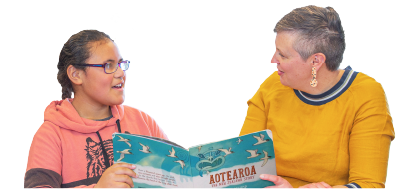Being Kiribati
Show video transcript
Audio of Kiribati dance music, students performing
Baue Rubeiariki, student leader, Manurewa High School, Auckland, facing camera:
So what I want the teachers to know about me is, my name is from my island. I speak the language. I, like, mostly everything about me is from my island...my values, my culture. Everything that I do represents my island. For the dancing that's like my favourite part and also the culture stuff like, as you can see long hair.
Teretia Tetabo, student leader, Manurewa High School, Auckland, facing camera:
Oh yeah, our dance is really unique. Like a lot of people go like, “Oh I've never seen that kind of dance before”. And the way we shake our hips and like the costumes as well. They like, really stand out.
Kiribati students performing
Every time we perform and then people come to us we're like oh like the costumes are really unique and they also compliment about the hair and stuff. How everyone just have all the same hair like, long and stuff.
Our parents like they take care of our hair like they treat it and then when it gets really long they like, they cut it, they use it for the men’s - It's used for the men’s costume, dance.
Baue Rubeiariki:
So basically like, if it's a girl she has to like, there will be no cutting hair, the hair has to be, like, treated with coconut oil all the time like tied up every time. We shouldn't be hanging it like this. We're not allowed to hang it out like this.
So I want people around the world to know that we, Kiribati, we’re friendly, kind and…
Student, standing with Kiribati performing students, facing camera
As a whole we are stronger and that even though our island is sinking we're still striving and we're still keeping our culture alive and, and we're not going to let us die out. Us, as Kiribati, are still alive and we are still well.
Baue Rubeiariki:
It's like the best feeling in the world when you know your island. And I know like my island is like right out there getting to be known by people. It's the best feeling, to me it's like, it gives me, like, more confidence to be proud of who I am and not to be shy in front of people.
Teretia Tetabo:
What we want for our future culture is for them to still be proud of our little island and present it, and keep the island rules going and everything in the house and...
Baue Rubeiariki:
The values...
Teretia Tetabo:
Yeah.
Baue Rubeiariki:
Our culture.
This video is about being Kiribati. One learner speaks about her culture, identity, and her island name. Kiribati culture and identity is embodied through dancing and costumes. Traditional costumes are unique and long hair is precious. When women cut their hair, men use it as part of their costumes. The hair has to be well treated and parents play a part to ensure girls’ hair is well maintained. Kiribati people are known to be friendly, kind and proud of their cultural traditions.
Reflections for individual teachers
As you watch this video think of the Kiribati learners in your classroom and reflect on your own self-identity.
- Ask your Kiribati learners when they walk through the school gate if they see part of themselves reflected in the school environment and the classrooms.
- How do you develop cultural awareness about Kiribati in your class? How can you actively engage your class in the subject of climate change and use Kiribati as a case study?
- How could you use the concept of hair being precious to design a project that invites Pacific learners’ to draw on their expertise and prior knowledge and speak about the value of hair in their culture and traditions? Teach a lesson or give a demonstration. The aim is for your learners to exercise their critical thinking and share authentic, genuine experiences.
- How will you engage with Kiribati parents and families in making decisions about their child's learning? Will it be a different approach to other island groups? If so, how?
Reflections for staff or departments
As you watch this video, as a staff member or member of a department team, think about how your school is meeting the needs of your Kiribati learners.
- How is your school building on the teachers’ knowledge of Kiribati culture to meet the needs of your Kiribati learners
- How are staff stimulating their thinking and engaging in discussion about their current practice? How responsive to the specific learning and cultural needs of Kiribati learners is your current teaching practice?
Ask your staff to walk around the school and classroom environments, to see if they can find and identify Kiribati tapa, artifacts, displays of Kiribati language and culture, or any other resources that relate to Kiribati learners in your school.


